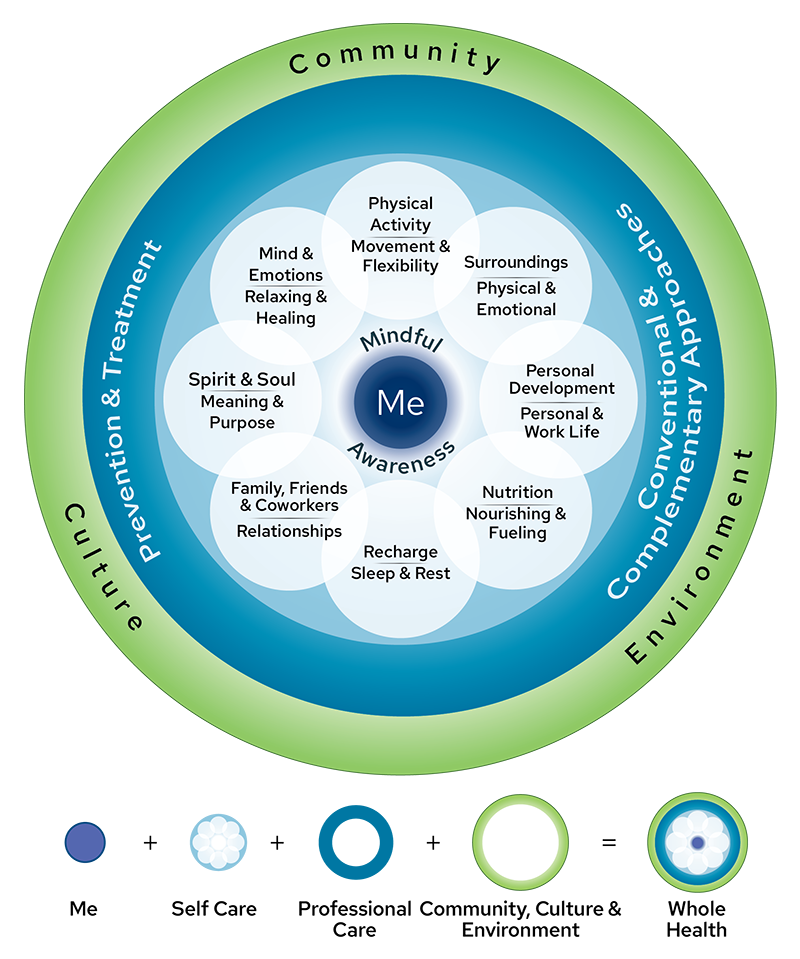Search Osher Center for Integrative Health Content
Integrative Whole Health Resources
The Integrative Health educational resources on this page are organized into Self-care and Professional care categories based on the Circle of Health graphic shown below. For more information about how to use the Circle of Health see Whole Health: Integrative Care Starts With Me
Self-Care – Organized into eight components of pro-active self-care and focused on lifestyle strategies and skills to support the whole person, body, mind, and spirit.
Professional Care – Explore ways clinicians and others can enhance whole health and well-being for various conditions through an integrative approach while bringing the best clinical care to patients.
Complementary and Integrative Approaches – Explore therapeutic and lifestyle approaches to health that focus on the whole person, are informed by evidence, and are aimed at achieving optimal health and healing.
Integrative and Whole Health Implementation – Integrative Whole Health is patient-driven and personalized. As a system, Integrative Whole Health seeks a cultural shift in perspective within healthcare teams, medical centers, and beyond to empower patients and be more fulfilling for clinicians. The resources in this section explore how clinicians can engage in their own self-care to increase resiliency and avoid burnout and how to implement strategies in clinical practice to achieve the goals of Integrative Whole Health.
Modules: All modules include a brief overview for clinicians, and several downloadable PDFs, including a more detailed handout for clinicians, a patient-focused handout, and one or more handouts on relevant topics for integrative approaches to care.
Handouts: These downloadable PDF files are patient-focused education on integrative self-care.
Self-Care
Mindful Awareness »
- Ways to be Mindful During COVID Parts I and II
- Introduction to Mindful Awareness
- Mindful Awareness Practice in Daily Living
- Precautions with Using Mindful Awareness
Practices - Eco-Wellness and Mindful Climate Action
Physical Activity: Movement & Flexibility »
- An Introduction to Physical Activity for Whole Health
- Get Moving: Adding Physical Activity into Your Routine
- An Introduction to Yoga for Whole Health
- An Introduction to Tai Chi and Qigong for Whole Health
Surroundings: Physical & Emotional »
- Environmental Intolerances/Multiple Chemical Sensitivity
- Eco-Wellness and Mindful Climate Action
- Indoor Environmental Health
- Introduction to Surroundings for Whole Health
- Assessing Your Surroundings
- Too Much Bad News
- Toxins and Your Health
- Healthy Work Habits: Avoiding Workaholism
- Improve Your Health by Removing Toxins From Your Body
- Ergonomics: Positioning Your Body for Whole Health
Personal Development: Personal & Work Life »
- The COVID Resilience Guide
- Introduction to Personal Development
- Finding Balance
- What Matters Most – Exploring Your Values
- Healing Power of Hope and Optimism
- Creating a Gratitude Practice
- Forgiveness
- Laughter Heals
- Self-Hypnosis – Clinician and Patient
- Using Journaling to Aid Health
- Mind/Body Awareness Writing Exercises
Nutrition: Nourishing & Fueling »
- COVID
- Digestion
- Detoxification to Promote Health: A 7-Day Program
- Eating to Reduce Irritable Bowel Symptoms: The FODMaP Diet
- Elimination Diet
- Gastroesophageal Reflux Disease (GERD) Elimination Diet
- Headache Elimination Diet
- When Your Food and Drink Could Be Causing You Problems: Elimination Diets
- Whole Health Food, Drink, Activity and Symptom Log
- Feeding the Family
- Food Safety
- General Nutrition
- An Introduction to Nutrition for Whole Health
- The DASH Diet
- Deciding How to be a Healthier Eater
- Healthy Tips on Eating Out and Grocery Shopping
- How to Eat a Mediterranean Diet
- Juicing Fruits and Vegetables
- Managing Carbohydrates For Better Health
- Omega-3 Fatty Acids: Some Frequently Asked Questions
- Protein Alternatives to Meat
- The Anti-Inflammatory Lifestyle
- Gut Health
- Mindful Eating
Recharge: Sleep & Rest »
- An Introduction to Recharge for Whole Health
- Hints for Encouraging Healthy Sleep
- Change Your Habits to Sleep Better
- The Health Benefits of Pausing and Taking Breaks
- Counseling for Insomnia
- Improving and Maintaining Healthy Sleep Habits
- Bright Light Therapy for Depression and Sleep Problems
Family, Friends, & Co-workers: Relationships »
- Compassion Practice
- Coping with Grief Following a Death
- Introduction to Family, Friends, & Co-workers
- Relationships and Health
Spirit & Soul: Meaning & Purpose »
- Introduction to Spirit & Soul
- Deciding What You Need for Spiritual Health
- How Do You Know That? Beliefs and Your Health
- Spiritual Anchors
Mind & Emotions: Relaxing & Healing »
- Meditation
- An Introduction to Mind and Emotions
- Meditation for Health & Happiness
- Progressive Muscle Relaxation and Progressive Relaxation
- Biofeedback
- Autogenic Training
- Hypnotherapy
- Two Ways to Work With Fear
- Breathing and Health
- Mantram Meditation
- Mindful Eating
- Seated Meditation
- Breathing Exercise
- Forgiveness
- An Integrative Approach to Helping Your Child Manage Stress
- Loving Kindness Meditation
- Mind/Body Awareness Writing Exercises
- Self-Hypnosis – Clinician and Patient
- Self-Hypnosis Balloon Technique for Abdominal Pain
- Using Guided Imagery
- Using Journaling to Aid Health
Professional Care
Bone Health
Cancer Care »
- Breast Cancer Care & Prevention
- Cancer: Websites for Information on Complementary and Alternative Medicine (CAM)
Digestive Health »
- Gastroesophageal Reflux Disease (GERD)
- Irritable Bowel Syndrome
- An Integrative Approach to Inflammatory Bowel Disease (IBD)
- The Anti-Inflammatory Lifestyle
- Eating to Reduce Irritable Bowel Symptoms: The FODMaP Diet
- Elimination Diet
- Food Safety
- GERD Elimination Diet
- Managing Carbohydrates For Better Health
- Headache Elimination Diet
- Juicing Fruits and Vegetables
- Mindful Eating
- Omega-3 Fatty Acids: Some Frequently Asked Questions
- Probiotics and Prebiotics
- Protein Alternatives to Meat
- Vegan Diets for Infants, Children and Adolescents
Endocrine Health »
- Integrative Treatment of Hypothyroidism
- Weight Management
- Maintaining Testosterone Levels Naturally
- Male Fertility
- Managing Carbohydrates For Better Health
- Non-Drug Ways to Manage Premenstrual Syndrome (PMS)
- Supplements for Hot Flashes During Menopause
Heart Health »
Immune System Health »
Men’s Health »
Mental Health
- Anxiety
- Attention Deficit Hyperactivity Disorder
- Autism Spectrum Disorders
- Depression
- Grief
- Posttraumatic Stress Disorder (PTSD)
- An Integrative Approach to Helping Your Child Manage Stress
- Integrative Approaches to Anxiety: Easing the Fear
Pain
- Chronic Pain
- Headaches
- Low Back Pain
- Myofascial Pain
- Neck Pain
- Osteoarthritis
- Self-Management of Chronic Pain
- Healing Touch for Self Care
- Using Journaling to Aid Health
- Wound Healing – Old Solution for an Old Problem
Pediatric Health
- Breastfeeding Tips and Resources
- An Integrative Approach to Feeding Your Baby
- Vegan Diets for Infants, Children, and Adolescents
- Approaches for Children with ADHD: Clinician and Patient
- Helping Your Child Manage Stress
Reproductive Health »
- An Integrative Approach to Feeding Your Baby
- Non-Drug Ways to Treat Post-Partum Depression
- Probiotics during Pregnancy to Prevent Infant Allergy
- Integrative Approaches to Promoting Labor in Pregnancy
Skin Health »
Substance Use »
Women’s Health »
- Breast Cancer Care & Prevention
- Non-Drug Ways to Manage Premenstrual Syndrome (PMS)
- Supplements for Hot Flashes During Menopause
Complementary and Integrative Approaches
- Websites for Information on CAM for Cancer
- Become a Partner with Your Clinician to Improve Your Health | En Español
- Wound Healing – Old Solution for an Old Problem
Biologically-Based Approaches
Dietary Supplements
- For Patients
- For Clinicians
Mind-Body Medicine
Manipulative and Body-Based Therapies
Energy Medicine
Whole Systems of Medicine
En Español
- Afrontar el Duelo
- Colabore con Su Proveedor de Atención Médica para Mejorar Su Salud
- Meditación para la Salud y la Felicidad
Integrative and Whole Health Implementation
Integrative Health in Your Own Life: Clinician Self-Care »
Implementing Integrative Health in Your Practice: What an Integrative Health Visit Looks Like »
Implementing Integrative Health in Your Practice: The Power of Your Therapeutic Presence »
Implementing Integrative Health in Your Practice: Complementary and Integrative Health »
An Integrative Health Care System: Patient and Team Perspectives »
Contact Information
For more information or to support our work, please contact: (for clinical services please see below)
Sara Arscott, MS, PhD
Outreach Program Manager
Phone: (608) 262-2218
Feedback
Please help us make our modules as useful as possible by filling out our brief module evaluation form.
UW Health
For Integrative Health and Wellness Services, please contact:
Phone: (608) 262-9355


